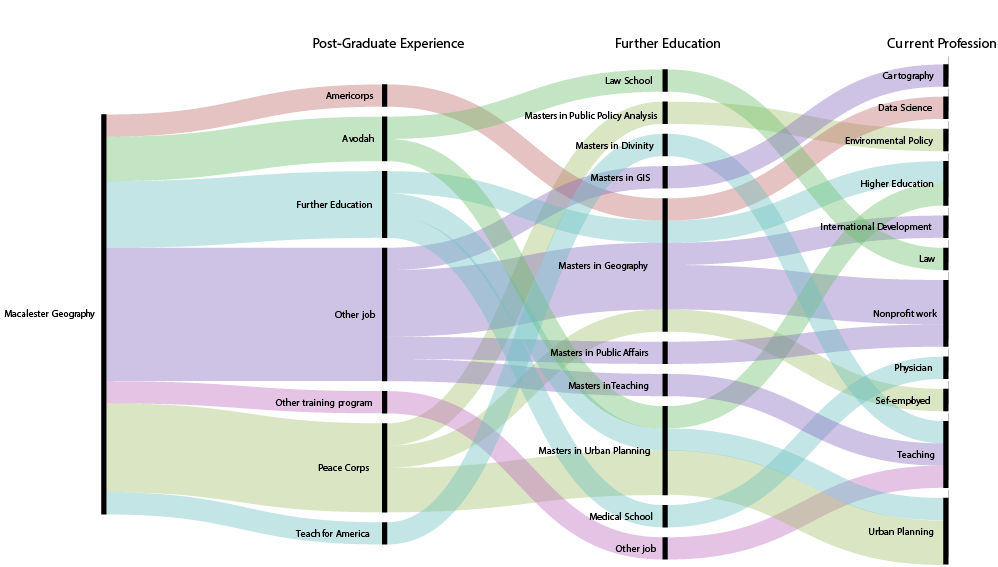
Whether they’ve joined the Peace Corps or attended medical school, we found that our pool of Macalester Geography graduates tend to pursue work in which they find personal meaning. To our interviewees, “meaning” often involves working with others, seeing one’s impact in a concrete way, or seeing oneself as part of a larger mission. Macalester alumni find meaning in a variety of professions, ranging from urban planning to law to nonprofit work. One participant described how she finds meaning in working at a plaintiff-centered law firm:
“I feel very strongly that it’s important for people who are smart and have the fortune to go to graduate school and get professional education to serve people. There are a lot of serious, serious problems in corporate America that, if you have the tools and the resources, you can expose. You can show people they’re happening and you can say that they’re wrong and you can try and stop them and help people. And for me it’s been extremely meaningful to get to do this work.”
Molly Bowen, class of 2007
Just as there is no definitive way for our Geography graduates to find meaning, there is no single profession or career path to which Geography leads. The field is wide and, as such, it opens doors to a vast array of fulfilling work opportunities.
The pathway to finding personal fulfillment in one’s work is not always straight nor clear. Recent alumni often gravitate toward post-graduate direct service work in a variety of settings. Though Peace Corps has been a common experience, other programs like Teach for America, Avodah, and AmeriCorps have also been pivotal in shaping the paths of these Geography graduates. These formative experiences allowed for skill-building and exposure to new experiences, but they also affect the broader worldview of alumni, while solidifying values that they find important to their work. For example, of her time in the Peace Corps, one participant said:
“As a geography major, I knew that there were structural reasons for poverty and I knew that as one little person I couldn’t save the world, but I realized halfway through [Peace Corps service] that I still did want to make a difference. And so I think that was part of what led me to pursue a professional degree, and I did a master’s in urban planning when I came back.”
Erika Jerme, class of 2005
Along their paths, these service-based programs and a wide array of other opportunities have also guided alumni in completely new directions, giving them the tools and connections to create a career that speaks to their needs and values. Learn more about Megan Macpherson’s journey to applying Geography and her values to her profession as a teacher.
Though there exist many different pathways to finding meaning, there are common methods utilized by our interviewees to find or apply meaning in their vocation. The geographic perspective – or being able to think spatially, relationally, and across systems – is utilized in many fields, including urban planning, teaching, and medicine. An urban planner emphasized the use of Geography in his field of work:
“I use geography everyday. Everyday I am pouring over maps, the walls in my workroom are magnetic so we can put up maps. I use the spatial lessons and awareness that I learned at Macalester everyday, and I love it. I really like that spatial thinking and awareness, that’s my starting point on every single issue.”
Josh Huntington, class of 1998
This perspective is especially useful in being able to see one’s place in the broader picture – whether it is in consideration of ethics, of creating larger change, or working across disciplines. One participant, Matt Landers, was able to apply his geography skills to work in the nonprofit and advocacy field. Other, more technical skills include the use of GIS or Remote Sensing in the workplace. A participant working in international development detailed the lasting lessons from Macalester Geography that she uses:
“There’s definitely still the way I approach and deconstruct a project and think about the geography of it. But there are also things that I learned in the GIS lab in 2005 that I probably use today. [Most of] the GIS skills that I learned – yes, it’s different now – but there are still fundamental things that you learn in those lab classes. It was a very good grounding.”
Emiko Brewer, class of 2006
These technologies allow graduates to study and visually represent information. These skills can be used in a variety of fields, such as policy research, urban planning, and public health. And though most alumni have found meaningful work with their bachelor’s degrees, many others pursue graduate degrees that allow them to specialize in a more specific field of their interest, including teaching, public affairs, and GIS. Geography, with its many possibilities and pathways, allows alumni to discern meaning and affect change in a variety of vocations.
